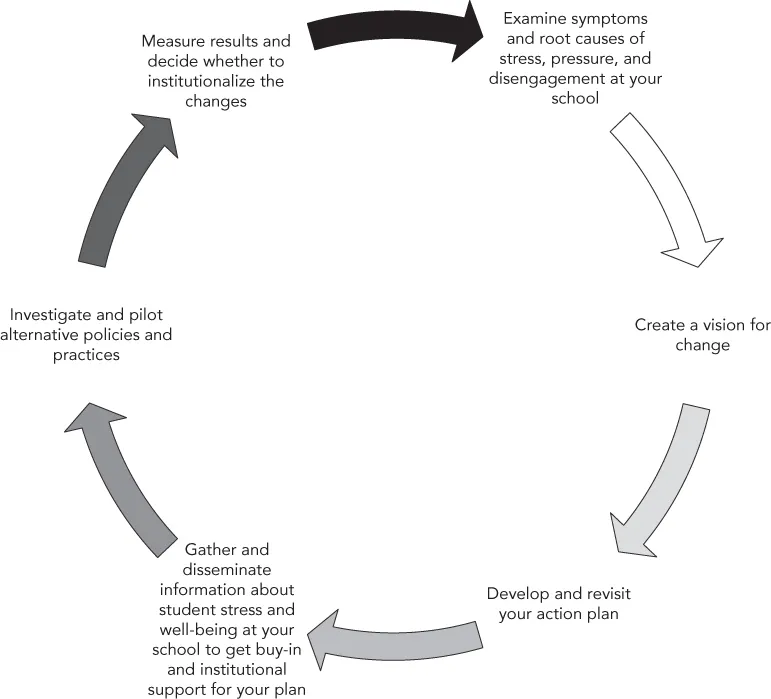
Overloaded and Underprepared
Strategies for Stronger Schools and Healthy, Successful Kids
- English
- ePUB (mobile friendly)
- Available on iOS & Android
Overloaded and Underprepared
Strategies for Stronger Schools and Healthy, Successful Kids
About this book
Praise for Overloaded and Underprepared
"Parents, teachers, and administrators are all concerned that America's kids are stressed out, checked out, or both—but many have no idea where to begin when it comes to solving the problem. That's why the work of Challenge Success is so urgent. It has created a model for creating change in our schools that is based on research and solid foundational principles like communication, creativity, and compassion. If your community wants to build better schools and a brighter future, this book is the place to start."
—Daniel H. Pink, author of Drive and A Whole New Mind
"Challenge Success synthesizes the research on effective school practices and offers concrete tools and strategies that educators and parents can use immediately to make a difference in their communities. By focusing on the day-to-day necessities of a healthy schedule; an engaging, personalized, and rigorous curriculum; and a caring climate, this book is an invaluable resource for school leaders, teachers, parents, and students to help them design learning communities where every student feels a sense of belonging, purpose, and motivation to learn the skills necessary to succeed now and in the future."
—Linda Darling-Hammond, Charles E. Ducommun Professor of Education, Stanford University
"Finally, a book about education and student well-being that is both research-based and eminently readable. With all the worry about student stress and academic engagement, Pope, Brown and Miles gently remind us that there is much we already know about how to create better schools and healthier kids. Citing evidence-based 'best practices' gleaned from years of work with schools across the country, they show us what is not working, but more importantly, what we need to do to fix things. Filled with practical suggestions and exercises that can be implemented easily, as well as advice on how to approach long-term change, Overloaded and Underprepared is a clear and compelling roadmap for teachers, school administrators and parents who believe that we owe our children a better education."
—Madeline Levine, co-founder Challenge Success; author of The Price of Privilege and Teach Your Children Well
"This new book from the leaders behind Challenge Successprovides a thorough and balanced exploration of the structural challenges facing students, parents, educators, and administrators in our primary and secondary schools today. The authors' unique approach of sharing proven strategies that enable students to thrive, while recognizing that the most effective solutions are tailored on a school-by-school basis, makes for a valuable handbook for anyone seeking to better understand the many complex dimensions at work in a successful learning environment."
—John J. DeGioia, President of Georgetown University
Frequently asked questions
- Essential is ideal for learners and professionals who enjoy exploring a wide range of subjects. Access the Essential Library with 800,000+ trusted titles and best-sellers across business, personal growth, and the humanities. Includes unlimited reading time and Standard Read Aloud voice.
- Complete: Perfect for advanced learners and researchers needing full, unrestricted access. Unlock 1.4M+ books across hundreds of subjects, including academic and specialized titles. The Complete Plan also includes advanced features like Premium Read Aloud and Research Assistant.
Please note we cannot support devices running on iOS 13 and Android 7 or earlier. Learn more about using the app.
Information
Chapter One
From Vision to Action: An Overview of the School Change Process
A Cheating Story
How Does This Work? Principles for Change
The Characteristics of Effective Challenge Success Teams

- Attends the Challenge Success fall conference and spring follow-up conference, and meets multiple times with the Challenge Success team coach at the school site.
- Regularly gathers and disseminates information to the school community about student health, engagement, and integrity, and encourages cross-stakeholder dialogue about this information.
- Has an action plan that reflects a vision for change and contains a clear but flexible schedule for moving forward.
- Holds meetings at least quarterly to review and push forward the action plan.
- Involves all stakeholders at each stage of the change process.
- Pilots discreet, incremental changes rather than trying to do too much all at once. Changes are based on the school community's needs and are known from research to improve engagement with learning and student well-being.
- Evaluates results of incremental changes before deciding to institutionalize reforms.
- Attends fall and spring Challenge Success conferences in future years as needed.
Identifying the Problem: Causes of Unhealthy Stress, Pressure, and Disengagement
Table of contents
- Cover
- Title Page
- Copyright
- Table of Contents
- List of Tables, Figures, and Exhibits
- Dedication
- About the Authors
- About Challenge Success
- Acknowledgments
- Introduction
- Chapter One: From Vision to Action: An Overview of the School Change Process
- Chapter Two: A Saner Schedule
- Chapter Three: The Homework Dilemma
- Chapter Four: Engagement Matters: Backward Planning and Project-Based Learning
- Chapter Five: Authentic and Alternative Assessments
- Chapter Six: The Advanced Placement Program—Benefits and Challenges
- Chapter Seven: Creating a Climate of Care
- Chapter Eight: Educating the Whole School
- Chapter Nine: Keeping Momentum for Positive School Change
- Appendix: Shadow Day, Fishbowls, and Dialogue Nights
- References
- Index
- End User License Agreement